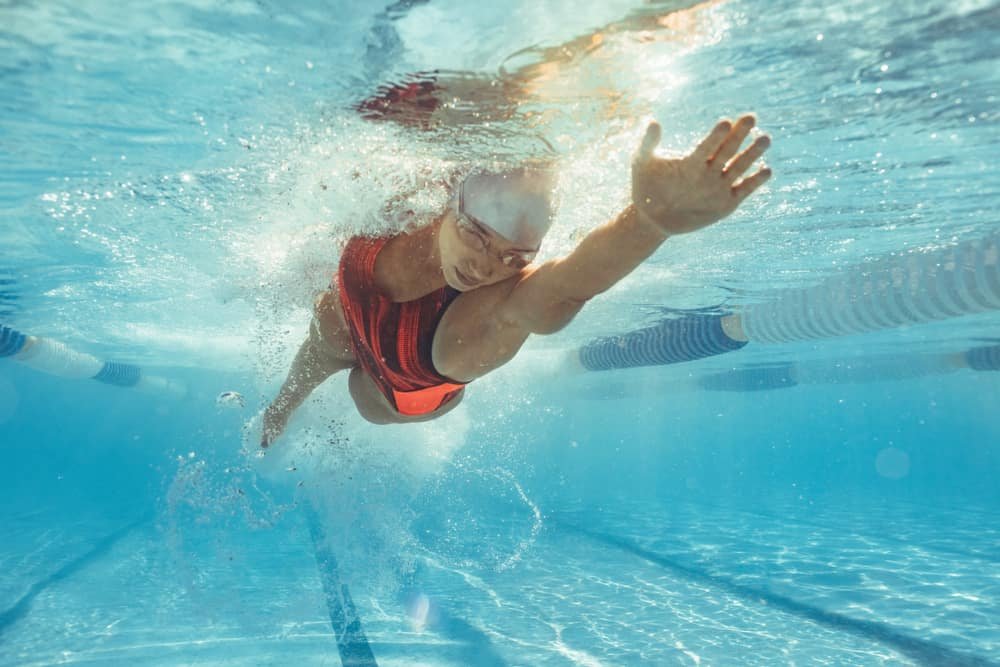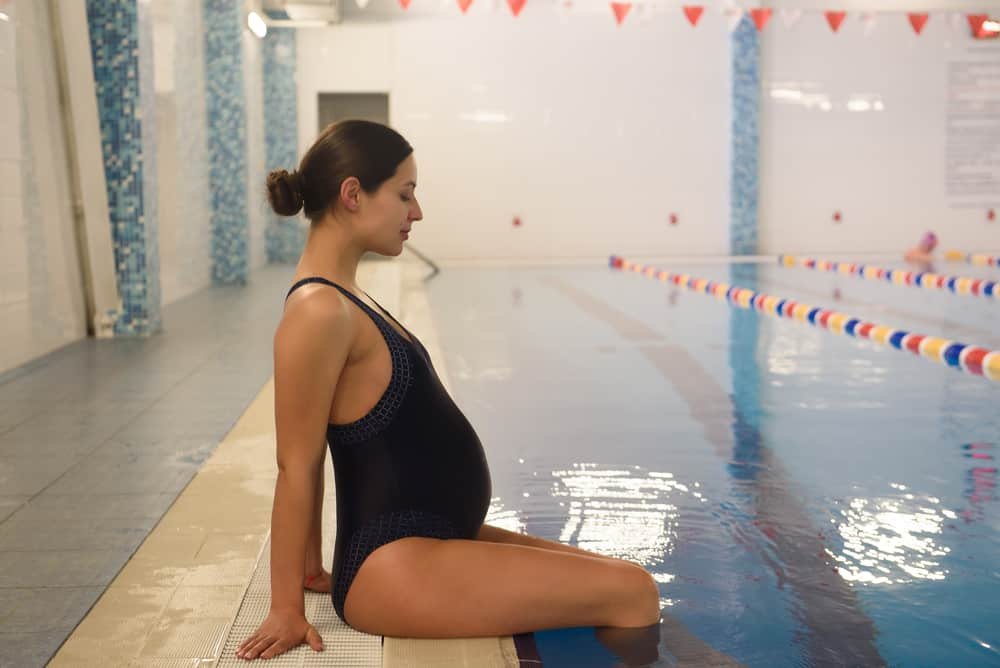
Do you enjoy swimming regularly? Yes? Then you’ll, probably, find the information below interesting…
Swimming is an exercise that doesn’t require much; it’s relatively affordable, as well as available to most of us. It’s an activity that can be, literally, practice by people of all ages. And although you’re probably familiar with the many health benefits of swimming, you might be wondering how it actually affects your body…
Swimming is a cardiovascular (aerobic) exercise, and as such, it will have your heart rates go up. A lot of the effects of swimming on your body will be connected with the effects of aerobic exercises, water, air, and sun exposure.
Let’s explore them.
These are 15 things that happen to your body when you swim every day.
1. Your Body Composition Will Improve.
Regardless of what swimming strokes you use, you will discover that swimming – although considered a low impact cardiovascular exercise – will work almost all your muscles.
By swimming regularly, you will be able to tone your whole body, as well as develop some muscle mass in the process.
Also, by swimming regularly, you’ll improve your:
- Strength.
- Lung capacity.
- Endurance.

2. Resting Heart Rate Will Improve.
The resting heart rate is the number of heartbeats per minute that you have when you are resting. When measuring your resting heart rate, you should be at complete rest – this means no strenuous physical movements. Also, if you have been under a lot of stress lately – or you are angry, for example – this may increase your heart rate.
Numerous studies have shown that all physical sports had a positive effect. However, endurance training has the best results in terms of reducing the resting heart rate.
Lowered resting heart rate is associated with lower all-cause mortality rates, stronger heart, and more.
3. You May Gain Weight.
Have you noticed that after swimming – even for a brief period – you tend to feel intense levels of hunger?
Even scientists are not quite sure why but swimming in colder water makes us more hungry, and therefore eat more . In fact, one study discovered that swimming in colder water led to people eating as much as 44% more calories on average.
4. You Can Lose Weight.
Don’t let the previous fact scare you.
Swimming is and continues to be a great way to tone your body and shed off some of the extra fat.
Let’s take this example from MayoClinic – they pointed out that a 160-pound person while swimming with a light or moderate pace will burn 423 calories each hour.
Compare that with an average walking pace – 314 calories, leisure cycling – 292 calories, and skiing downhill – 314 calories.
Coupled with a proper diet, swimming can definitely help you trim the extra pounds.

5. You May Be Exposed to the Effects of Chlorine.
A lot of swimming pools today use chlorine in order to disinfect the water. Usually, the levels of chlorine are minimal and not considered dangerous.
However, some people may experience some adverse effects.
Your body will be exposed to the chlorine, especially if you swim in pools with poor ventilation. And we can absorb chlorine through the skin and through breathing as well.
Some problems that can be caused by high chlorine exposure are:
- Skin rashes and redness.
- Difficulty breathing.
- Itchy eyes
- Throat pain.
- Stomachaches.
- Nausea.
- Vomiting.
- Coughing
- Excessive inhalation of chlorine can even cause asthma.
6. Swimming Affects Depression.
One of the long-known and time-proven benefits of working out is that it improves and boosts our mood.
One research discovered that swimming, in particular, can lower depression significantly.
While before swimming the numbers seemed concerning – as nearly half of the people surveyed reported feeling moderately depressed – after swimming that figure nearly vanished. It went from 44 to just 8 people feeling moderately depressed. And almost 2/3 of the people felt normal after swimming.

7. Swimming Can Heal Your Body.
Swimming, in its essence, is one of the, if not the, best low impact exercises. Water interacts with our bodies in a particular way due to its buoyancy.
This is why swimming is frequently and widely used as a recovery method for different conditions and injuries, such as:
- Arthritis
- Disability
- Injuries to the ligaments and the skeletal muscles.
For example, one study found that people with osteoarthritis had reduced joint pain, a better range of motion, and less limitation to their movements after practicing swimming or cycling.
In another study, people with multiple sclerosis had reduced pain, less fatigue, and improved mood.
8. You Will Sleep Better.
Cardiovascular exercises have been shown to improve sleep quality.
One study showed that aerobic exercises – like swimming – are a vital part of improving one’s sleep quality. They had a positive effect even on people with chronic insomnia.
9. Better Pregnancy.
Swimming may be beneficial to pregnant women, too.
The increased weight during pregnancy may be really hard on some women, and swimming can have a beneficial effect on their body. It can help support the increased weight effectively by taking off some of the additional stress that is placed on the spine, ankles, etc., thus allowing pregnant women to stay more active.

Nevertheless, keep in mind that it is necessary to consult your doctor before engaging in any physical activity during pregnancy.
10. Swimming and Smoking.
Interestingly enough swimming may affect your smoking cravings, too.
Dr. Philip Whitten, who wrote the “The Complete Book of Swimming”, investigated 162 participants and kept track of their smoking habits. In the beginning, 25% of them were smokers, and after taking on swimming for some time, that percentage was cut down to just 3%.
11. Lower Blood Pressure.
Cardiovascular exercises and better blood pressure can go hand in hand.
Since swimming improves your heart – making it stronger – it can help you pump blood more efficiently and with less effort, decreasing the (blood) pressure that exerts on the arteries.
In some cases, the effects can be as good as some medications.
On the other hand, if you already have proper blood pressure levels, swimming regularly can help you maintain them.
12. You May Live Longer.
In one broad study covering more than 40,000 men between 20 to 90 years old concluded that swimmers have lower mortality rates and thus were expected to live longer.
And there was an interesting discovery made as the studies compared the different sports people were into. Compared to runners, swimmers had better survival rates.

Even though the study was done on men, women should also see similar results.
13. Improves Cognitive Skills.
Cardiovascular exercises have been proven to aid and improve our cognitive function (memory). This may lead to better and more flexible thinking, planning, prioritizing, task initiation, and more.
Besides, regular exercise can cause different physiological changes to happen in our bodies, like reducing our insulin resistance and overall inflammation markers. At the same time, exercise can lead to higher production of certain chemicals that can stimulate the growth and recovery of the brain’s blood vessels.
14. Improves Blood Sugar Levels.
Exercises, like swimming, for example, has been shown to improve insulin levels, as well as to lower blood sugar levels. In addition, it may be helpful to people with type 2 diabetes, according to one study which showed that regular training had positive effects.
15. Saltwater and Your Skin.
Ocean and seawater have higher amounts of certain minerals and elements. This usually leads to the skin feeling a lot softer and smoother to the touch.

Swimming in the ocean has been reported to alleviate symptoms of psoriasis, eczema, acne, and other skin conditions. However, the reports do vary. Some people with eczema find the saltwater soothing while others may not really see any benefits at all.
